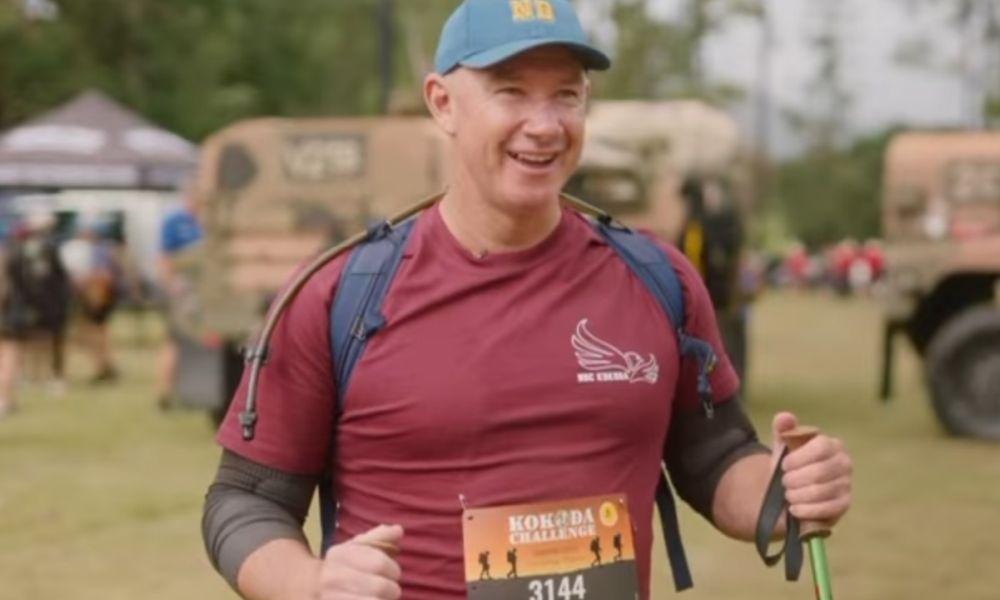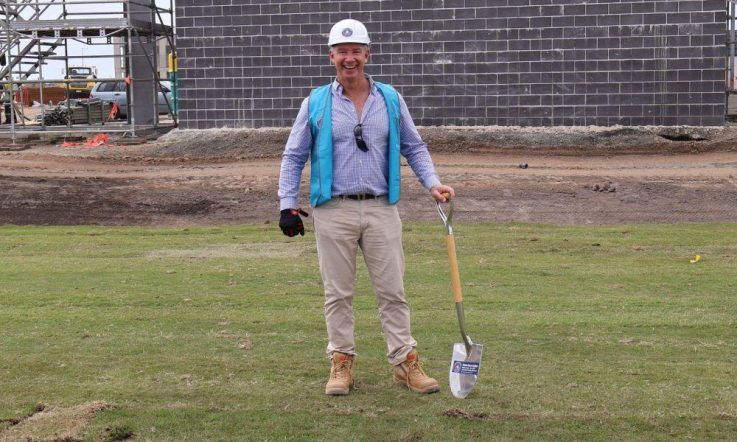Hello, Teacher editor Jo Earp here and I’m your host for today, but before we get into this episode a reminder that if you’re looking for more free content from Teacher head over to the teachermagazine.com website. There are thousands of articles, infographics, videos and podcasts in our archive, including transcripts of all the episodes from all our series – they’re all online, they’re all open access, and we publish fresh content throughout the week!
Hello, thanks for joining me for this Teacher podcast – I’m Jo Earp. School Assembly is the series where we find out what it takes to build a new school from scratch. This is Series 3 and we’ve been following Dan McShea from Notre Dame P-12 College on Queensland’s Sunshine Coast for nearly 12 months. Last time out we spoke about professional learning.
The topic for Episode 10 is distributed leadership and the leadership pipeline. We’ll be talking about unleashing the talent in your own team, whether that’s the leadership team, those middle leaders, teachers or support officers. Dan will be talking about developing that pipeline and how all of that links back to those core documents at the college, and the strategic planning. As with every episode of School Assembly, we’ll also find out about his biggest challenge, key learning and proudest achievement since we caught up last. I hope you enjoy it!
Jo Earp: Hi, Dan it's lovely to see you again, and there's been an awful lot going on at Notre Dame since we last spoke. I can see that you've had chess championships, you've had cross country running, you had a scientists’ day for the under 8s, you had a visit from an author and an illustrator. Loads of really lovely learning experiences there for the students, and I was thinking the staff look like they're having a great time too. And I want to give a special shout out to Miss O’Brien, your secondary science teacher!
Dan McShea: Thanks Jo, she’ll be delighted to hear that. It's been a, yeah, an exciting time at Notre Dame College and we've definitely packed a lot into what's been our first 17 weeks, and I think our staff, I think they are having a great time. One of the other notable things that has happened is our staff all competed in the Kokoda Challenge with our year 7 cohorts.
JE: Oh wow.
DM: So that was that was pretty special. Every single teacher did the 18-kilometre challenge in the mud; and we wanted to challenge our year 7s to do hard things – and so they embraced that, they were there in the dark, in the mud with their parents and the family spirit at our school was really evident on that day. So that was a pretty special moment. And there has been a lot happening. The weeks seem to blend into each other. And, yeah, I don't even know when that was, but it was in the last 2 or 3 weeks.
JE: That sounds fantastic. Great for sort of bonding as well, isn't it and going through those experiences together?
DM: Yep, yeah, absolutely. And yeah, we want to have that message that we embrace challenges in life and at school and we do hard things. So, it was a perfect opportunity to demonstrate that to our students.
JE: Nice one. Just on that external visitor as well, you had Dr Cameron Stelzer I think. That's really good to make those links and invite somebody in to work with students, not just in terms of – I'm sure that it created extra enthusiasm, but also just supporting the work that staff are doing with that little bit of extra expertise in a particular area.
DM: 100 per cent, you know Dr Stelzer’s visit was a highlight and brings fresh perspectives and also just reinforces that love of reading. My team reads in Prep, 1, 2 and 3 every week for half an hour, we swap classes each term. But, you know, to pick up a book when they've already [met] the author – they're just a little bit more interested in that book. ‘Oh, that's that book we were told about. We drew that character.’ It was pretty special.
And there's been a few opportunities already where we've partnered with members of the local community. We've had a concept called Marvellous Men and Wonderful Women where we get a community member, typically a parent, to come and share their story and to be asked some questions. We've had the Federal Member, Andrew Wallace, we've had our Westpac surf lifesaving helicopter land on our oval. So, we're always looking to reach out and, you know, partner with the local community where it reinforces what we're trying to do here at school.
JE: Yeah, it reminds me of that first episode that we had with you when I remember talking about, you know, the links that you had with the community, and I know that that was a priority for you. So, that's nice that you've been able to build those links nice and early. OK then, we're going to talk about distributed leadership and the leadership pipeline today. We kind of touched on some of this in Episode 4, and we talked then about your leadership approach and philosophy. And you were telling me a bit about how you came to be a principal – that included taking on an acting assistant principal role a couple of times, and then a deputy principal and a principal. What was that sort of pipeline like for you in terms of the support available? Because some teachers and leading teachers who want to make that step are maybe thinking, will there be that kind of wrap around support for me?
DM: Yeah, it really got me thinking that question, Jo. I personally had no aspirations whatsoever to become a principal. I thought I'd landed my dream job as a sports master at a school, at Noosa. And yeah, I accidentally fell into acting opportunities just by saying ‘yes’. And, you know, however I love my job as a principal, it's now my 4th principalship – I've had a secondary and 3 P-12 colleges. I've never really had a mentor, as such, in the early years of my principalship. I've certainly had some wonderful colleagues and some great opportunities.
I'd say that, for me, one of the catalysts for me ever believing that I had any capacity to lead a school was a principal who I really respected believing in me and encouraging me to take on opportunities; and that was certainly true of my first acting assistant principal role, which he encouraged me to take on at a different school. When I returned, he encouraged me to take on a similar role in the school I was at and at the end of that he actually encouraged me to go and leave, and get some experience, in the hope that I would come back to that school in a couple of years; and I did do that, but I didn't come back. You know, one thing led to another. I did take on a deputy role in North Queensland, which became a principal role, and then other principalships followed there. And I guess I was prepared to say ‘yes’ to opportunities, and I was prepared to leave my comfort zone and, you know, respectfully, take jobs probably that nobody really wanted before I got the ones that would be more sought after.
And I think that that's a really important part of our leadership. I think it's a [Michael] Fullan book (2003), the moral imperative of school leadership is to develop capacity in others. And I think that conversation that our principals have with their good leaders on their staff, that instils some belief, I think the trajectory and the possibilities of that are pretty limitless; and it highlights the importance of those goal-setting conversations that we have and those interactions that we have with our staff.
JE: So, linking that into starting a new school then. You’ve hinted there you’re also thinking about planning that kind of pipeline within your own school, not just in the system, but giving those opportunities for others to progress. So, would that be written into, would that be sort of explicit in your long-term strategic planning then? How's that catered for?
DM: Yeah, look, absolutely. We’ve recruited a really high-quality foundational staff of teachers, and within that group – there's only 28 of them and one day that'll be 280 staff – within that group, certainly there's future assistant principals, there's future middle leaders that are currently teachers, and there's school officers (3 of them) who will be teachers next year. And whether any of those people get that opportunity here or elsewhere it's still important that we're developing each other and our school is set up for that. So, we've recruited for potential, we've recruited for energy, enthusiasm, adaptability and I've mentioned that before. And yeah, certainly our staffing strategy is about building the future leaders for our school.
JE: What does it actually like in practice? Would you ever do something like job shadowing? I'm just thinking, what are the ways to support those future leaders to kind of get a bit more exposure and experience in terms of not just the role but the responsibilities. Because like with most jobs, it's about learning on the job isn't it, a lot of times? But is there anything you can do sort of ahead of the time?
DM: We've created a culture where teachers are naturally collaborating and visiting each other's classrooms regularly and learning from each other. In terms of job shadowing, certainly you know there's times when I would take leave and people will act in my role and subsequent other seats will be filled; and those opportunities are available in the school. Within our system there is a process by which aspiring leaders can express interest in being available for acting roles in other places, and I'm sure that exists in every system. But, you know, with the role of principal you really do have to just throw yourself headfirst into that role, and for a lot of principals that's a make-or-break sort of opportunity.
I didn't have an opportunity to act as a principal before I was a principal. I was a deputy and became a principal in that same school, and there were certainly some positives for me about that in that transition. I knew the community, I knew what I was getting myself into, good and bad, but I didn't have a lot of mentors. I actually probably learnt more from the non-example that I'd seen than the example.
JE: Yeah, you've mentioned that before, yeah. [And again] it's the same in any job, isn't it, it's kind of like, yeah, you're out your comfort zone a bit, you've just got to actually just jump in at some point!
DM: 100 percent you do, yep.
You’re listening to podcast from Teacher. If you’ve just discovered our podcasts and Teacher magazine, I want to let you know about the additional free content on the teachermagazine.com website. You’ll find more than 3,000 articles, infographics, videos and podcasts in the archive – they’re all online and open access. And it’s where you can sign up to our regular bulletin to get the latest content and trending topics, delivered straight to your inbox. We publish fresh content throughout the week; access everything and sign up to the bulletin at teachermagazine.com. OK, back to my chat with Dan McShea.
JE: In terms of creating structures, then, for staffing to allow that – because you know there's this thing around distributed leadership – allowing that talent to be unleashed. So, giving people opportunities, not necessarily to progress but whilst they're in their current role to unleash the talent that they have – and you're just a couple of terms in, which is difficult – how will that kind of structure change, if at all, as the school continues to grow?
DM: Oh, look, you know the expansion of our student numbers will lead to an evolution of all of our leadership roles. We're actually just about to, or our recruitment process for the 5th member of our leadership team is underway at the moment. We're nervous about who we let into our team, we're excited about what they'll bring, but we sort of want to hold the line and acknowledge we've got a really good team at the moment, we don't want to lose that. We don't want to our culture to be diluted when others join us, we want it to be galvanised; and I think, you know, it's so critical now the staff that we recruit for next year. And there's only, I think, another 10 people will join us next year, but it's really important that they're going to continue what we've started, and our current staff need to hold the line on that.
In terms of middle leadership, we only have 4 middle leaders at the moment and in the next triennium we'll have closer to 11 middle leaders, and so there's a lot of expansion, and there certainly are some people on our staff that would be well ready and suitable to take on some of those roles. But there'll also be a need for new energy, new talent, new skills to come and join our team as we continue to grow.
And we've said to our foundation staff from the very beginning that they are the gatekeepers of our story and of our culture. And so, we've invested heavily in that, and we've trusted them, we've given them opportunities, and they've run with that so far. So, continuing to create that culture of collaboration and shared responsibility when we've got that point of truth that we all come back to – that's our mission, that's our Notre Dame Way, that's our Notre Dame Education Strategy that keeps us all in line so we can have that trust, we can keep referring back to what our goals are.
JE: Yeah. Just reflecting on what you said earlier about the principal that you had, and you got going off somewhere – that's the other thing, isn't it, as a leader, you've got to be prepared to be comfortable with encouraging people to go and seek other opportunities elsewhere. You know, it's part of growth, isn't it?
DM: Yeah. Yeah, I think so Jo. I've always been particularly interested in what's coming up and who's at Uni and who's nearly finished and what jobs there are, even in other Dioceses. I did have 2 principalships in Regional North Queensland and I'm fully aware of how hard it is to get quality people and, you know, to recruit staff. Sometimes you're trying not only to get a teacher, but to get a house for them and a netball team and some friends and some incentives so that they can just stay for a couple of years; and that's only become harder since I left, on the back of COVID and other challenges that they've had out there.
So, those leadership opportunities when they do come up, they're wonderful opportunities for a great adventure … you know, being a principal in a place like that, it might be a smaller school, but it's still a hard job. Perhaps it's harder to get quality staff, there's location challenges. And yeah, I would really encourage someone who has aspirations to lead to be prepared to get out of their comfort zone and take on that challenge that perhaps, you know, it might be a foot in the door, but you're still getting all the skills that are required of a quality principal.
JE: Yeah. Keep your mind open to opportunities that are maybe not where you thought they were going to be, maybe not as close to where you're living currently, that kind of thing. There are always opportunities. With distributed leadership then, you mentioned about trust – there's got to be that clarity then hasn’t there, on what the responsibilities are, and that really links into that trust and relationships. And we talked about that in previous episodes, empowering staff, trusting expertise, working together. I remember you saying in a previous episode about, you know, it's really the ‘we’ rather than the ‘I’ isn’t it.
DM: Look, yeah, that's important. I'm personally really conscious of that, it is a team effort. We've got a great team, we've got our core guiding documents, and we want to use ‘we’ language, we want to celebrate the success of others, and our work's about creating culture. So, our staff have stuck their hand up for, you know, far more things than I could have expected them to, out of the generosity of their hearts. And I think that's on the back of they see love of work being authentically modelled, they love their jobs, they have family spirit, they have been communicated with transparently, and they've bought in to what it means to be a staff member here. And that's pretty special. It's a honeymoon period – I'm well aware of that, it's the first semester and it's not going to last forever – but some of the stories that will be retold from this special time, hopefully, you know, they hold as our school gets bigger and more complex, and probably more challenges as well.
JE: That's a nice way of looking at it. That's the other thing, as well, I mean you know, as a leader, if you're saying ‘yeah, we're going to set out, we're going to do this distributed leadership, I’m going to give you this responsibility’ and then you don't follow through on that, and you're not trusting people. There's nothing worse than that. You're not going to get a buy-in then, so that's important.
DM: Yeah. And they're not going to do it exactly how you would have done it. And, you know, part that trust is, yeah, OK, well, you know, it's great that this is happening … and then they're going to run with it, and they're going to do things perhaps differently, perhaps better than you would have. Perhaps you would have changed some things, but it's happening, and you can't do everything yourself. And so, it is important and, yeah, so far that's been working pretty well here.
JE: Yep. OK then, we're going to finish with the usual 3 questions for this episode. We've got key learning, biggest challenge, proudest achievement. Take it away, please.
DM: Oh, key learning – I think, on that note, keep looking after, keep believing in and keep trusting your staff and they'll keep buying in and they'll keep delivering for you, and we've seen that this year. Our biggest challenge – look, we've been peddling pretty hard at the moment to juggle a lot of balls, including looking forward to, you know, capital grant applications for buildings for next year and design for buildings for next year, compliance matters. We've had official openings and blessings and lots of things going on – which should be true of any principal listening to this – and balancing that with wanting to be present to the community. So, just trying to keep all those balls in the air has been a challenge but also matched by the excitement that's come with that.
And the proudest achievement was a moment when all of our staff completed that Kokoda Challenge that I mentioned earlier with our entire year 7 cohort and their parents present. That was a beautiful moment. Family spirit is one of our characteristics, and it was really evident. That was a beautiful moment that set the benchmark for kids to say ‘we do hard things, and we embrace challenges’, and next year we'll expect our year 7s to do the same and that was pretty special.
JE: Excellent. Well, it's been great catching up with you. Next time, of course, is going to be the final episode. And we will have been following you for 12 months at that point, but it's going to be a chance to reflect on all those different achievements, the journey. We'll talk about what you've learned from the podcast experience, too. So, we'll catch up again soon for the finale!
DM: I look forward to it, Jo. Thanks very much for your time – have a great day!
That’s all for this episode – thanks again to Dan McShea in Queensland, and my thanks to you for joining me wherever you are. That was the penultimate episode of Series 3 of School Assembly so stay tuned for the finale next month. If you want to keep listening now there are more than 360 episodes from the last 11 years of Teacher podcasts to choose from, including our series on Behaviour Management, School Improvement and our monthly Research Files. Find those wherever you get your podcasts from. Hit the follow button to make sure you don’t miss out on new episodes, including that series finale of School Assembly. And please leave a rating and a review while you’re there. Bye!
The Teacher bulletin is your free, weekly wrap of our latest content – not just the podcasts, but also the articles, the infographics and videos – straight to your inbox. Click on the sign-up button at our website, teachermagazine.com.
Other episodes in Series 3:
- Episode 1: Meet our Series 3 principal
- Episode 2: Growing student enrolments
- Episode 3: Crafting a school vision and mission statement
- Episode 4: Leading a new school
- Episode 5: From building site to finished school
- Episode 6: Setting the teaching direction and a Series 1 and 2 update
- Episode 7: The first day of school
- Episode 8: Getting your policies and procedures in place
- Episode 9: Professional learning
References
Fullan, M. (2003). The Moral Imperative of School Leadership. SAGE Publications.
In this episode Dan McShea talks about the importance of school leaders developing capacity in others. How do you do this in your own school? What opportunities are there for staff to watch other, more experienced colleagues, in their leadership roles? How does this link into your strategic planning?



